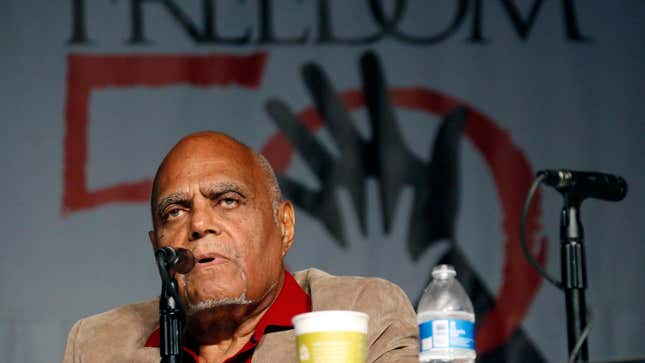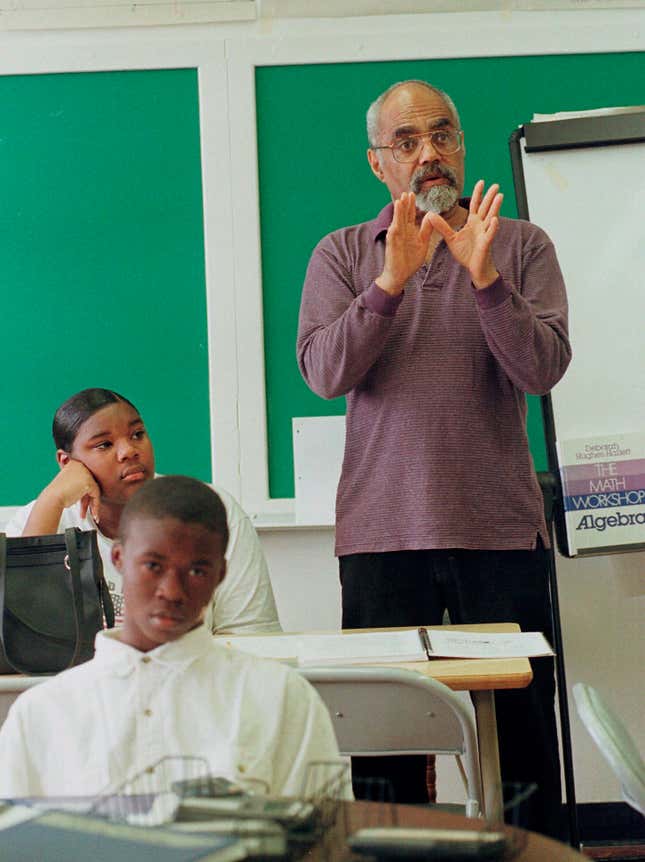
“[In] Mississippi, Bob Moses was the equivalent of Martin Luther King,” Taylor Branch, author of the Pulitzer Prize-winning Parting the Waters: America in the King Years 1954-1963, told The New York Times in 1993.
Moses, a pioneer in the struggle for civil rights in America, was one of the more subtle figures in the crusade, characterizing himself as “organizer, not a leader,” reports New York Times. Nevertheless, whether taking to the rural communities of Mississippi or to the classroom, Moses invested decades in the fight for equality. On Sunday, July 25, Bob Moses died of unspecified causes at his home in Hollywood, Fla, as confirmed by his eldest daughter, Maisha Moses. He was 86 years old.
“He exemplified putting community interests above ego and personal interest,” N.A.A.C.P. President Derrick Johnson, told the Times. “If you look at his work, he was always pushing local leadership first.”
Moses was born Robert Parris Moses on Jan. 23, 1935 in New York City, where his parents Gregory and Louise, a janitor and homemaker, respectively, prioritized education in the home. Raised in the Harlem River Houses public housing complex, Moses attended New York City’s public but highly selective Stuyvesant High School, moving on to Hamilton College in Clinton, N.Y. before earning a master’s degree in philosophy in 1957 from Harvard. The death of his mother and subsequent illness of his father reportedly forced Moses to abandon his doctoral studies and return to New York, where he became a math teacher at the Horace Mann School in the Bronx.
Already a burgeoning activist at the time, Moses noted in his 2002 memoir Radical Equations: Civil Rights From Mississippi to the Algerbra Project, that news accounts of the civil rights movement then picking up steam in the South compelled him to leave teaching in 1960 to travel to Mississippi. Moses (along with co-author Charles E. Cobb, Jr.) wrote that the images of Black people staging sit-ins and protests “hit me powerfully, in the soul as well as the brain.”
He joined the Student Nonviolent Coordinating Committee (S.N.C.C.) and later became director of fellow civil rights organization the Council of Federated Organizations. Quickly becoming known in Mississippi’s rural communities for his intense engagement, Moses could often be found sporting denim overalls as he tried to empower Black Mississippians—often sharecroppers—to vote.
“Moses pioneered an alternative style of leadership from the princely church leader that King epitomized,” Branch told Mother Jones magazine in 2002, adding: “He is really the father of grass-roots organizing—not the Moses summoning his people on the mountaintop as King did but, ironically, the anti-Moses, going door to door, listening to people, letting them lead.”
Like many of his contemporaries, Moses faced brutal violence, frequent arrests and imprisonments, and relentless threats upon his life for his efforts. More from the Times:
In 1960 he left his job as a high school teacher in New York City for Mississippi, where he organized poor, illiterate and rural Black residents, and quickly became a legend among civil rights organizers in a state known for enforcing segregation with cross burnings and lynchings. Over the next five years, he helped to register thousands of voters and trained a generation of organizers in makeshift freedom schools.
White segregationists, including local law enforcement officials, responded to his efforts with violence. At one point during a voter-registration drive, a sheriff’s cousin bashed Mr. Moses’ head with a knife handle. Bleeding, he kept going, staggering up the steps of a courthouse to register a couple of Black farmers. Only then did he seek medical attention. There was no Black doctor in the county, Mr. Moses later wrote, so he had to be driven to another town, where nine stitches were sewn into his head.
Another time, three Klansmen shot at a car in which Mr. Moses was a passenger as it drove through Greenwood, Miss., Mr. Moses cradled the bleeding driver and managed to bring the careening car to a stop.
Moses was also a co-creator of the 1964 Mississippi Freedom Summer Project and the Mississippi Freedom Democratic Party. At the Democratic National Convention in Atlantic City, N.J. that same year, he worked alongside Dr. King, Fannie Lou Hamer and mentor Bayard Rustin to garner full recognition as the state’s delegation, rather than a “compromise” to seat two Freedom Party members with the existing all-white delegation.
Mr. Moses called the convention a “watershed in the movement” because it showed that support from the party’s white establishment was “puddle-deep,” and he despaired over the possibility of building a biracial coalition that also bridged class divisions.
“You cannot trust the system,” said Moses in 1965. “I will have nothing to do with the political system any longer,” he vowed.
As his notoriety grew, Moses would also withdraw from the primary ranks of the movement, fearing that his presence would overshadow its needs. He turned his attentions to protesting the Vietnam War, noting in a 1965 speech that “the prosecutors of the war” were “the same people who refused to protect civil rights in the South” (h/t The Times). Suspiciously, he was drafted soon thereafter, despite being five years over the age limit. Denied conscientious-objector status, Moses and his wife Janet moved first to Canada and then to Tanzania, where he taught and the couple began a family; three of their four children were born on the continent.
Eight years later, Moses returned to the States in 1977 to resume his Ph.D. studies in the philosophy of mathematics at Harvard. Those studies would serve both him and the community well in 1982, when the then 47-year-old discovered Maisha’s eighth grade class didn’t teach algebra. At the invitation of her teacher, Moses began to teach advanced work to Maisha and several classmates; a development that would soon after evolve into The Algebra Project.
From Washington Post:
Though less dramatic and harrowing than getting Black voters to the polls in Mississippi, the Algebra Project marked a pivotal shift in his civil rights vision from political to economic equality.
The project has instructed thousands of middle school students in what Mr. Moses called “math literacy” as a crucial steppingstone to college and employment, an often difficult process among underserved students.
Low math achievement among minority students is “the nation’s dirty secret,” he often told educators. He urged them to avoid the tendency to neglect the subject and instead help students escape their “serf-like communities” within high-tech society, just as sharecroppers earlier sought release from the serfdom of the plantation.
The program, which “relies on igniting enthusiasm among students by having them link common daily tasks to basic mathematical procedures, using schoolyard vernacular and helping one another with minimal teacher input,” won Moses a MacArthur Foundation “genius” grant to fund its first five years. It began to go national by the early ‘90s, and by 2001 was serving 10,000 students in 28 cities with a $2.5 million annual budget (h/t the Post). To date, the award-winning program has reached over 40,000 students in hundreds of schools nationwide, with measurable positive results.

“Math literacy is a civil right,” said Moses (h/t the Post). “Just as Black people in Mississippi saw the vote as a tool to elevate them into the first class politically, math is the tool to elevate the young into the first class economically.”
Moses’ The Algebra Project also proved a full-circle moment, as Moses returned to Mississippi in the early 1990s to help launch the Delta Algebra Project, “a direct continuation of his civil rights work,” noted the Post.
“But this time, we’re organizing around literacy—not just reading and writing, but mathematical literacy,” he told the Times. “The question we asked then was: ‘What are the skills people have to master to open the doors to citizenship?’ Now math literacy holds the key.”
Moses is survived by his wife Janet, daughters Maisha and Malaika, sons Omowale and Tabasuri, and seven grandchildren. And of course, his incredible legacy also survives, as does his wisdom about America’s much-needed “awakening,” as he noted to the New York Times amid the racial justice protests of 2020.
“I certainly don’t know, at this moment, which way the country might flip,” he said. “It can lurch backward as quickly as it can lurch forward.”
Rest in Power, Bob Moses.

